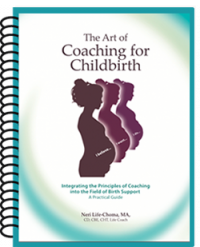
Coaching Conversations for the Birth Partner’s Soul
“You know, you weren’t there when the couple was making their baby. Give them some alone time”. This is what a midwife told me early on when I was a student enrolled in a hospital-based doula training program. This teaching moment could have probably been achieved in a more inspiring way, but I must admit that she made an important point and her words stayed with me throughout my 24 years of practicing as a doula. Over a decade after this lesson, when I enrolled in a yearlong program to become a transformational life coach, I learned another lesson relating to birth partners. I learned that If I coach even as little as two people, I am practicing group coaching and that the coaching conversations must address and resonate with birth partners’ souls.
Partners’ background, beliefs, values, fears, challenges, and strengths are equally important and interact with those of the expectant persons
I can clearly see the difference between these two approaches, and how they interact. I also see how valuable both approaches are to birth support practices. The lesson I got from the midwife was about making room for the birth partners during childbirth so that my supportive presence won’t interfere with their ability to support their loved ones. The later lesson focuses on the verbal coaching strategies that not only give room for birth partners to show up for their loved ones but acknowledge their background, beliefs, values, fears, challenges, and strengths are equal components that interact with those of the expectant persons, and hence need to be addressed. With masterful verbal coaching skills, we can lead prenatal conversations that recognize and reflect on this dynamic.
Assess and clarify the partners’ level of engagement
Masterful coaching conversations rely heavily on strong questions. One of the questions doulas must ask the birth partner is “How do you see yourself supporting your loved one during birth?”. I must say, though, that my experience has been that partners hardly ever know the answer to this open-end question. So I provide them with a range of options. I share that I’ve worked with partners who are not providing any physical support and restrict themselves to ‘logistical support’ such as taking photos, bringing food, taking things out of the bag, taking care of siblings, updating the grandparents, and so on. On the other side, I continue sharing, there are partners who want me to be the fairy whispering in their ear what to do next so that they are at the ‘front line’ of childbirth support. And of course, there are partners who take a middle approach that we explore and define together in accordance with their vision and capacity.
Then I continue to ask a series of great coaching questions that is more tangible. Here are some of those questions I suggest you ask:
- If it weren’t for the cultural expectation that birth partners are present throughout the whole process, would you want to be present? How much and in which moments?
- Do you have your own expectations or ideas about the desired birth experience?
- How important is it for you that your ideas, beliefs, and feelings will be included in designing the birth experience? If you could put it in percentage, how much do you need to be aligned with your loved one’s choices?
- What do you see yourself physically doing during childbirth?
- What do you usually say to provide emotional support, and do you think it will be available for you during childbirth?
- Are you willing to carve the time to practice labor support tools and comfort measures regularly so that you can learn the “steps of the dance”?
- How would you describe your advocacy skills when communicating with authoritative figures? How well are you prepared to advocate for your loved one’s desired experience and needs?
Adjust your prenatal conversations to match partners’ engagement levels
This process is doing a lot more than clarifying the partners’ level of engagement. It gives them permission to choose what’s right for them, and it helps couples explore and share their expectations and hopes about partners’ involvement.
Conducting a series of prenatal coaching conversations is key to advancing your practice. This is one of the main practices we focus on at Birth Coach Method. Without this series of prenatal coaching conversations, you might find yourself overdoing, overcoming, underearning, or unsuccessful in leading clients to their desired experiences. In turn, you might experience burnout or even be traumatized. Clarity about the partners’ involvement and engagement level will be very helpful when you lead these coaching conversations. It will allow you to address the partners’ needs and include them in the decision-making process at a level that matches their readiness and wishes. Additionally, you’ll be able to avoid professional challenges such as taking sides when conflicts arise or trying to resolve problems that origin marital relationships dynamics.
Conducting masterful conversations is how we model to new parents how to communicate when their parenting perceptions expectations, and ideas do not match
Modeling teamwork
This series of questions, although is being introduced to the birth partner, is an invitation for an open heart conversation. The couple is invited to share their thoughts and expectations around the partner’s role and engagement with each other. You want to hold a safe and non-judgmental space for them, and even use humor to give them permission to share their predetermined ideas around these questions even when they are not on the same page. Conducting masterful conversations like this one is the best way to model for new parents how to communicate when their parenting models, expectations, and ideas do not match.
The more I develop my conversational coaching skills, the more I recognize how meaningful these prenatal and postpartum coaching conversations are in helping my clients grow into the position of the parents, or ‘the designated adults’ in their kids’ lives. These juicy conversations engage the partners and give them opportunities to improve their communication skills, gain confidence, and become experts in their lives. Couples get to resolve differences in opinions, reach agreements and generate strong convictions that will help them to advocate for themselves and for their kids in the future. It is inspiring and moving to see them building their teamwork.
Photo by Kelly Sikkema on Unsplash
- Overshadowing the Transformative Essence of Childbirth with Data - July 10, 2024
- Navigating the Epidural Dilemma - May 28, 2024
- Informed Decision in Birth Support: A Myth of Empowerment? - April 29, 2024


